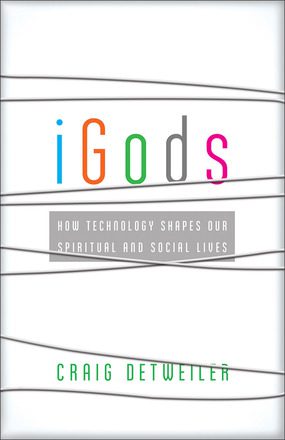 The blog InternetEvangelism offers a review of “Gods: How Technology Shapes Our Spiritual and Social Lives” – new book by Craig Detweiler.
The blog InternetEvangelism offers a review of “Gods: How Technology Shapes Our Spiritual and Social Lives” – new book by Craig Detweiler.
Communication scholar, film-maker, and cultural commentator Craig Detweiler’s new book iGods: How Technology Shapes Our Spiritual and Social Lives (Brazos Press 2013) should be essential reading for any Christian interested in the impact of contemporary technology on their faith. In one of the most thorough and eclectic studies I have encountered, Detweiler examines how the technologies, web services, and social media networks of Apple, Amazon, Google, Facebook, YouTube, Twitter, and Instagram hold the potential to transform contemporary theology and practices of worship.
What are ‘iGods’?
Detweiler’s central term ‘iGods’ refers to the power these technological monoliths hold to become idols in our lives as well as to the god-like features they possess: Google’s ability to amass seemingly infinite information and answer seemingly every possible query, Amazon’s ability to predict our likes and interests, and Facebook’s way of networking us instantaneously across the globe, throwing geographic boundaries to the wind. There are facets of contemporary technology that seem omniscient, omnipresent, and omnipotent, and Detweiler asks us to consider: What are we, as Christians, to make of this? How can we use technology to build instead of erode our faith? How can we more conscientiously approach the adoption of technology in our everyday lives, worship practices, relationships, and churches?
An iGod per chapter
In each chapter, Detweiler takes on an iGod, exploring the theological risks and potential positive spiritual benefits. In his chapter on Apple, for example, he considers how the sleek simplicity and beauty of Apple’s product designs can remind us of God’s love for aesthetics and approachable but wondrous design. It can teach us about how we might design church spaces to draw guests. But he points out as well the symbolism of Apple’s logo — a bitten apple — which serves as a reminder to not be consumed by the lust for more and more products, upgrades, and iDevices, convincing ourselves that the next product will complete us, or committing ourselves to a commercial brand rather than more eternally-valuable causes.
Visit the review at InternetEvangelism not only for his insights into the other iGods but also thought provoking questions at end of each chapter.
The lens through which Detweiler suggests we go about mastering the storm of social media, the web marketplace, and the abundance of technological devices that consume our world is biblical. His claim is that technology can teach us both about God’s original and desired intent for humanity as well as provide us with reminders of the particular types of vices — self-promotion, greed, jealousy — that our current technological moment must lead us to side-step. Detweiler neither suggests that we abandon nor wholeheartedly embrace technology; rather, we should maintain an arms-distance posture, taking its best assets, using it to draw us and our neighbors closer to God and to better our world, leaving its detrimental effects behind.
Amber M. Stamper, the reviewer, holds a Ph.D. in English (Rhetoric and Composition) and is an Assistant Professor of Language, Literature, and Communication at Elizabeth City State University in North Carolina. Her research and publications center on religious rhetoric and communication, especially issues of Christian evangelism and the digital church.
Read more: http://www.internetevangelismday.com/blog/archives/11877#ixzz2pkiL5aAg
at Internet Evangelism Day
Under Creative Commons License: Attribution
Read more: http://www.internetevangelismday.com/blog/archives/11877#ixzz2pkg1oRoD at Internet Evangelism Day
Under Creative Commons License: Attribution

